| Listing 1 - 10 of 41 | << page >> |
Sort by
|
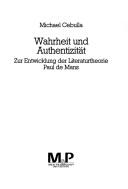
ISBN: 3476450104 Year: 1992 Publisher: Stuttgart M und P
Abstract | Keywords | Export | Availability | Bookmark
 Loading...
Loading...Choose an application
- Reference Manager
- EndNote
- RefWorks (Direct export to RefWorks)
Book
ISBN: 0671775944 9780671775940 Year: 1992 Publisher: New York Poseidon Press
Abstract | Keywords | Export | Availability | Bookmark
 Loading...
Loading...Choose an application
- Reference Manager
- EndNote
- RefWorks (Direct export to RefWorks)
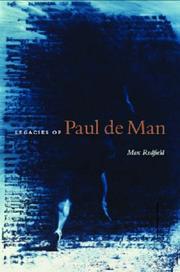
ISBN: 9780823227617 9780823227600 082322760X 0823227618 0823248097 0823240959 Year: 2007 Publisher: New York Fordham University Press
Abstract | Keywords | Export | Availability | Bookmark
 Loading...
Loading...Choose an application
- Reference Manager
- EndNote
- RefWorks (Direct export to RefWorks)
More than twenty years after his death, Paul de Man remains a haunting presence in the American academy. His name is linked not just with "deconstruction," but with a "deconstruction in America" that continues to disturb the scholarly and pedagogical institution it inhabits. The academy seems driven to characterize "de Manian deconstruction," again and again, as dead. Such reiterated acts of exorcism testify that de Man's ghost has in fact never been laid to rest, and for good reason: a dispassionate survey of recent trends in critical theory and practice reveals that de Man's influence is considerable and ongoing. His name still commands an aura of excitement, even danger: it stands for the pressure of a text and a "theory" that resists easy assimilation or containment. The essays in this volume analyze and evaluate aspects of de Man's strange, powerful legacy. The opening contributions focus on his great theme of "reading"; subsequent chapters explore his complex notions of "history," "materiality," and "aesthetic ideology," and examine his institutional role as a teacher and, more generally, as a charismatic figure associated with the fortunes of "theory." Because the notion of legacy immediately raises questions about the institutional transmission of thought, the collection concludes with two appendixes offering documentary aids to scholars interested in de Man as an institutional presence and pedagogue. The first appendix lists the courses taught by de Man at Yale; the second makes available a previously unpublished document, almost certainly authored by de Man: a course proposal for the undergraduate course "Literature Z" that de Man and Geoffrey Hartman began teaching at Yale in the spring of 1977.
Criticism. --- Deconstruction. --- De Man, Paul.
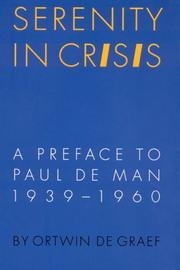
ISBN: 0585021368 9780585021362 0803216947 9780803216945 Year: 1993 Volume: v. 4 Publisher: Lincoln ; London : University of Nebraska Press,
Abstract | Keywords | Export | Availability | Bookmark
 Loading...
Loading...Choose an application
- Reference Manager
- EndNote
- RefWorks (Direct export to RefWorks)
Languages & Literatures --- Literature - General --- De Man, Paul. --- De Man, Paul Adolph Michel --- De Man, Paul --- Man, Paul de --- DeMan, Paul
Book
ISBN: 023398741X Year: 1991 Publisher: London : André Deutsch,
Abstract | Keywords | Export | Availability | Bookmark
 Loading...
Loading...Choose an application
- Reference Manager
- EndNote
- RefWorks (Direct export to RefWorks)
Book
ISBN: 9780415215138 Year: 2001 Publisher: London ; New York : Routledge,
Abstract | Keywords | Export | Availability | Bookmark
 Loading...
Loading...Choose an application
- Reference Manager
- EndNote
- RefWorks (Direct export to RefWorks)
Paul de Man's work is key to the American deconstruction movement and to the so-called political turn in critical theory. Seventeen years after his death, his works continue to arouse violent reactions among critics. This book explains why de Man is such an important voice, detailing his critical position, exploring his intellectual and historical contexts, tracing the influence of his work and enabling readers to undertake independent study of his criticism.
Deconstruction --- De Man, Paul --- Contributions in criticism.
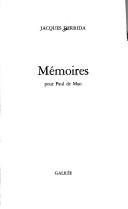
ISBN: 2718603321 9782718603322 Year: 1988 Publisher: Paris : Editions Galilée,
Abstract | Keywords | Export | Availability | Bookmark
 Loading...
Loading...Choose an application
- Reference Manager
- EndNote
- RefWorks (Direct export to RefWorks)
Literature --- Man, de, Paul --- Criticism --- Memory (Philosophy) --- De Man, Paul, --- Philosophy --- De Man, Paul, - 1919-1983
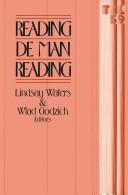
ISBN: 0816616604 0816616612 9816616612 081668278X Year: 1988 Volume: v. 59 Publisher: Minneapolis (Minn.): University of Minnesota
Abstract | Keywords | Export | Availability | Bookmark
 Loading...
Loading...Choose an application
- Reference Manager
- EndNote
- RefWorks (Direct export to RefWorks)
Thirteen essays address de Man's theory and practice of reading, including the nature of those readings and what they signify forreading in general, not just for literary texts.
De Man, Paul --- Man, Paul de --- Contributions in criticism. --- De Man, Paul. --- Criticism --- History --- Critique --- Histoire --- DeMan, Paul --- De Man, Paul Adolph Michel

ISBN: 0803216947 Year: 1993 Volume: v. 4 Publisher: Lincoln University of Nebraska press
Abstract | Keywords | Export | Availability | Bookmark
 Loading...
Loading...Choose an application
- Reference Manager
- EndNote
- RefWorks (Direct export to RefWorks)
82.0 --- Academic collection --- 82.0 Literatuurtheorie --- Literatuurtheorie --- De Man, Paul. --- Man, Paul de --- Literature --- Man, de, Paul --- DeMan, Paul --- De Man, Paul Adolph Michel --- De Man, Paul --- De Man, Paul (1919-1983) --- Histoire et critique
Book
ISBN: 0674273753 Year: 1998 Publisher: Cambridge, Massachusetts ; London, England : Harvard University Press,
Abstract | Keywords | Export | Availability | Bookmark
 Loading...
Loading...Choose an application
- Reference Manager
- EndNote
- RefWorks (Direct export to RefWorks)
One of the most knowledgeable and provocative explicators of Paul de Man's writings, Rodolphe Gasché, a philosopher by training, demonstrates for the first time the systematic coherence of the critic's work, insisting that de Man continues to merit close attention despite his notoriously difficult and obscure style. Gasché shows that de Man's "reading" centers on a dimension of the texts that is irreducible to any possible meaning, a dimension characterized by the "absolutely singular." Given that de Man and Derrida are both termed deconstructionists, Gasché differentiates between the two by emphasizing Derrida's primary interest in "writing," and postulates that the best way to come to terms with de Man's works is to "read" them athwart the writings of Kant, Fichte, Hegel, Heidegger, and Derrida. He shows his respect for the "immanent logic" of de Man's thought--which he lays out in great detail--while revealing his uneasiness at the oddness of that thought and its consequences.
Criticism --- History --- De Man, Paul --- Criticism and interpretation.
| Listing 1 - 10 of 41 | << page >> |
Sort by
|

 Search
Search Feedback
Feedback About UniCat
About UniCat  Help
Help News
News